Year Towards Zero Waste
NUS has various waste reduction strategies in support of Singapore’s Year Towards Zero Waste.
Initiatives by Students Against Violation of the Earth
The NUS Students Against Violation of the Earth (SAVE) has implemented a few waste reduction strategies on campus.
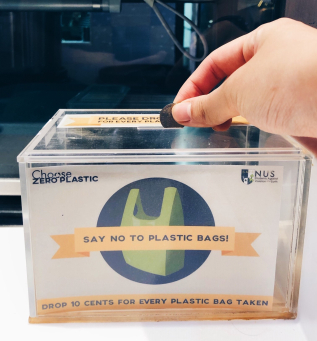
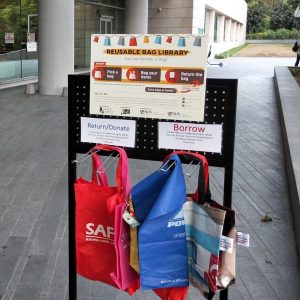
Plastic Bag Tax
Launched in 2008, the Plastic Bag Tax is a 10-cents tax for each plastic bag taken. It has since become one of SAVE’s most well-known initiatives.
The funds collected from the Plastic Bag Tax is channelled into the NUS Sustainability Fund. The fund finances student-led projects like Project Box and Project Tumbler, which aim to ameliorate the environmental issues we face today.
Project Box & Project Tumbler
Launched in 2010 and 2012 respectively, Project Box and Project Tumbler offer customers incentives for bringing their own reusable boxes or bottles when buying takeaways.
Under Project Box, when customers bring their own lunch box to take away food for five times, they will receive a $2 discount for their next meal. Similarly, under Project Tumbler, customers get to enjoy a $0.50 rebate for their next drink if they bring their own tumbler to contain their takeaway drinks for five times.
Reusable Bag Library
Launched in 2018, the Reusable Bag Library promotes the use of reusable bags by providing easily accessible alternatives to plastic bags at the point of purchase.
The bags from the Reusable Bag Library are contributed by the NUS community, for the NUS community. Physical stands with reusable bags are placed near convenience stores and other locations. Customers can borrow, return and contribute additional bags at any collection point.
Lite Catering
Launched in 2019, the Lite Catering scheme aims to reduce disposable food containers that are used at places where takeaways are the main viable option.
Lite Catering has been launched for selected takeaway kiosks and school events. The scheme loans food vendors and event organisers reusable lunch boxes to pack their customers’ or participants’ food in. Customers and event participants can consume their food anywhere before returning the lunch boxes back to designated collection points. A washing vendor collects the boxes after lunch hours to wash before returning them the next day.
Going Straw Free
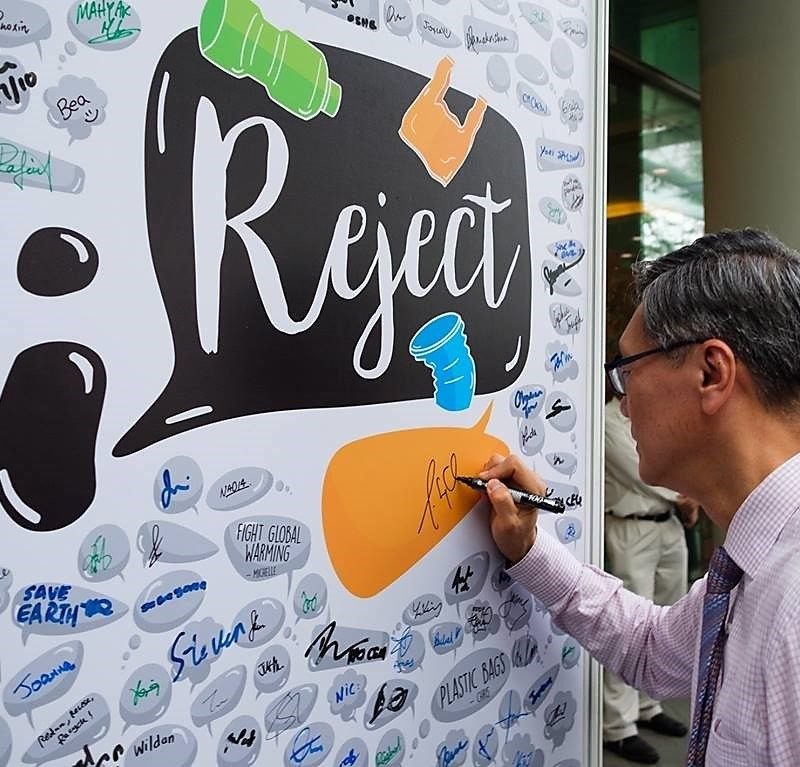
Since 2018, most food and beverage outlets on the NUS campus have stopped offering plastic straws, as a step towards reducing non-essential plastic waste. Paper straws are offered only on demand.
As part of the iReject campaign to reduce plastic waste on campus, plastic straws are no longer offered by default by most food and beverage outlets. This is a first step to encourage the NUS community to make environmental sustainability a personal responsibility via waste reduction.
Reducing Takeaway Disposables in Student Residences
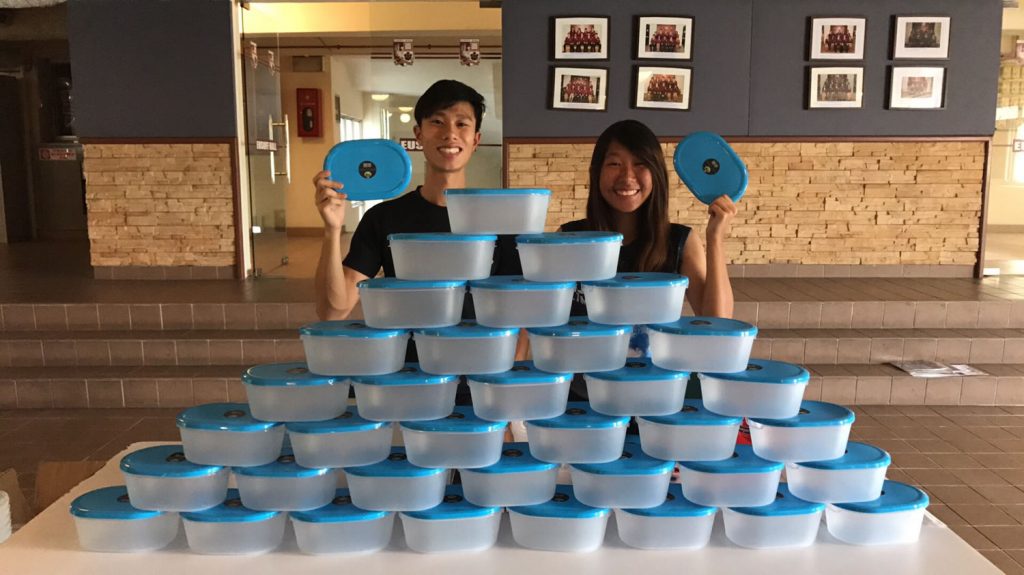
Since 2016, various student residences have implemented measures to reduce the use of takeaway disposables in their dining halls.
These measures include increasing fees for single-use takeaway boxes over a few years, supplying reusable lunchboxes to residents at subsidised or no cost, offering free food to residents who come with reusable lunchboxes at events and completely stopping the provision of takeaway disposables in dining halls.
Giving Used Items a Second Life
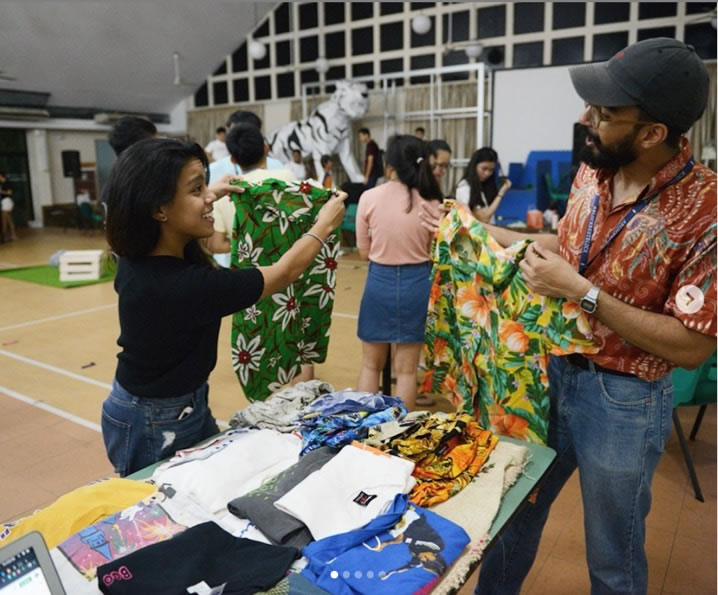
An ongoing practice in student residences is the collection of used items during mass check-out from outgoing residents, to be redistributed to incoming residents in the subsequent semester.
Items that were redistributed and reused include clothes, books, stationery, cleaning products etc. This not only prevented these items from becoming trash; it also prevented additional consumption by eliminating the need for incoming residents to purchase new items.
Telegram Groups to Reduce Food Waste
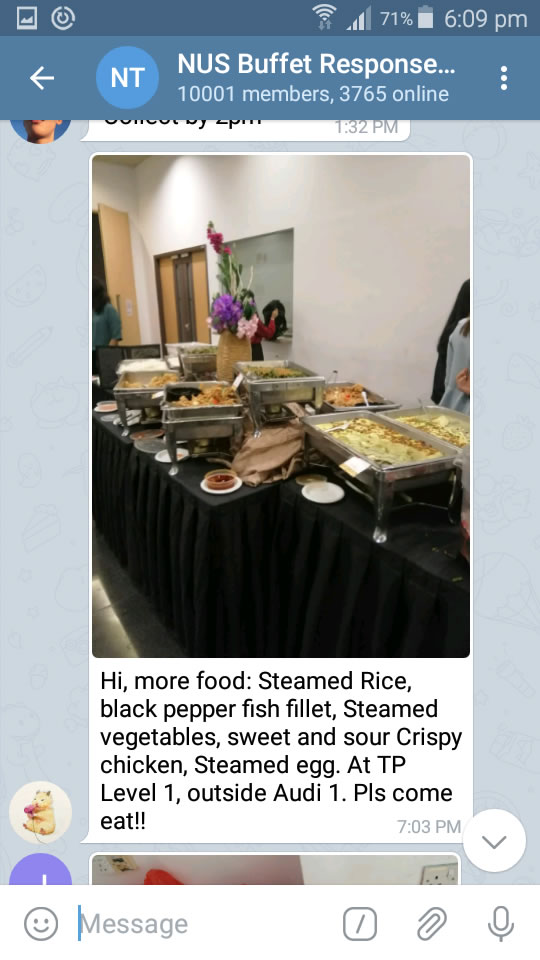
Since 2016, a few Telegram groups have been set up to address food wastage. Examples include the NUS Buffet Response Team and the Telegram Food Bot.
The NUS Buffet Response Team notifies members of leftover food from events help on campus. Permission is first sought from event organisers, before locations of leftover food are posted to invite members to help themselves to the food. The Telegram Food Bot is used by residents of Sheares Hall on meal plans, to either give away their meals if they are going to be away from the dining hall, or redeem extra food given away by others.
